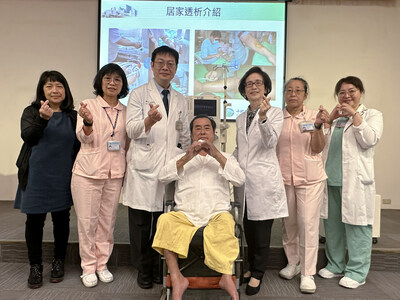Action required: Please refresh your browser
We have recently implemented some changes that require a hard refresh of your browser: Please hold down the CTRL-key and press the F5 key.
After a successful hard refresh, this message should not appear anymore.
More details about this topic are available here »
| CMUH(Taiwan) Using AI to Monitor Home Hemodialysis | ||
| By: PR Newswire Association LLC. - 18 Mar 2024 | Back to overview list |
|
|
It's been safer and healthier for chronic kidney disease patients TAICHUNG, March 18, 2024 /PRNewswire/ -- Chronic Kidney Disease has become a new "national disease" in Taiwan, and the number of patients requiring hemodialysis is increasing. Traditionally, hemodialysis patients and accompanies require at least an hour spent on commuting, and that maybe even more time consuming for those who live in suburbs. Moreover, patients almost feel tired or fatigue and need rest half a day following hemodialysis. Since 2019 in Taiwan, China Medical University Hospital (CMUH) has initiated and implemented AI monitoring system for hemodialysis patients. The unique AI system receives the messages sent by the dialysis machine to keep track of any risk message with incorporated AI system, ensuring patient safety and collecting information for prescription adaptation. Accredited with CMUH's AI technology, those who require hemodialysis are not necessary to visit a healthcare facility for this routine. Dr. Huey-Liang Kuo, Director of Hemodialysis Center at CMUH, stated that patients have been heathier and safer to do hemodialysis at home. Mr. Lin, a 62-year-old residing in a remote area of Taiwan, has been undergoing hemodialysis for thirty years. With reduced mobility, he faced the challenge of commuting for two hours every other day to receive his routine four-hour hemodialysis treatment. This rigorous schedule often left him feeling fatigued after each session. However, five years ago, Mr. Lin's situation took a positive turn when he enrolled in the Home Hemodialysis (HHD) training program at China Medical University Hospital (CMUH). Since committing to HHD in 2019, Mr. Lin has experienced a significant improvement in his quality of life. Today, he not only enjoys more time with his family but also remains energetic enough to successfully manage his own business. According to Dr. Kuo, HHD has been a choice of renal replacement therapy more than fifty years in some countries, but in Taiwan the general public has very limited knowledge about it. Dr. Kuo further explained, "patients and their family are concerned about the safety of doing it at home. It is worth to notice that patients may be given the option of HHD to avoid fatigue from traditional hemodialysis which has side effects on their work and daily life. "Approximately 12% of the Taiwanese, or about 2.86 million people, have Chronic Kidney Disease, and more than 80 thousand of these patients have progressed to end-stage kidney failure that require routine hemodialysis or peritoneal dialysis, with 90% selecting the former" stated Professor Chiu-Ching Huang of Nephrology Center at CMUH. With HHD, patients may be able to return to their jobs the following day, thereby enhancing their quality of life and minimizing the disruptions caused by hemodialysis schedules. Professor Huang further explained, "The tiredness following hemodialysis comes from ultrafiltration and osmotic imbalance, as hemodialysis in medical facilities takes up 4 hours and requires rapid dehydration to remove the excess water as well as uremic toxins accumulated in a patient's body, leading to drastic change in osmotic pressure. Patients usually experience serious fatigue and require considerable rest." Prof. Huang pointed out that HHD takes a longer time (8 hours), however, water and waste are removed in a slow but steady rate that comes with a less drastic change in osmotic pressure and less stress on patient's heart. Patients don't feel tired after hemodialysis and can continue with their work." As for the safety of HHD, patients need to complete a training program lasting 8-12 weeks and encompassing the establishment of vascular access puncture, operation and troubleshooting of hemodialysis machine, blood pressure and pulse monitoring, recording a nursing report, emergency evacuation, medical waste management, and the maintaining of dialysis RO water quality. They also need to pass a final test of independent operation before they can do it at home. Media Contact:
SOURCE China Medical University Hospital 
|
||
|
||
 | Back to overview list | |




